|
Do you have relatives who are veterans?
It seems almost everyone has been touched in
one way or another by WWII veterans and I appreciate the opportunity
recognize a few of them. I realize this article deals exclusively
with Pacific theater but I'd like to acknowledge a few friends and
family members.
Elmer Ording (uncle)
Army - Normandy
Alvin Ording (uncle)
Navy - Pacific
John Ording (father)
Army Air Force - wars end mopup
Philip Junk (father in law)
Army - Battle of the Bulge - German POW
I also have two friends who's fathers I'd like
to recognize
-- Bernie Beltz, Royal Australian Navy - Pacific
-- Ed Chabot, Army Air Force - B-29's off Tinian
They rarely talked about their involvement in WWII
(in some cases not at all, not even with their wives) Sadly, they
took it with them to their graves, all but my father (who was the
youngest) have already passed away. I know many veterans don't care
to revisit those day's but unless we keep their stories alive, I'm
afraid future generations may not know (or care) about what their
grandfather's endured.
Another veteran I would like to recognize is Mark
Gagnon. He never talked about it either, in fact until about two
year's ago. I didn't even know he was a veteran. Once I learned
he was at Leyte I would occasionally ask a basic question which
usually got a short one word response. He recently started reading
Dan Bailey's new book and told me he found it interesting. I saw
the door crack open, so I tried a few questions regarding the Pacific
in general. His wife Alice joined in with a few questions of her
own hearing some of it for the first time.
Many details remain a little fuzzy, but some of it he remembers
like it was yesterday. He served aboard the Gambier Bay (baby flattop
CVE73) His ship participated in the attack at Saipan and Tinian
and his job (at GQ) was to feed the 40mm anti aircraft guns. He
recalls (his gun crew) desperately trying to shoot down a (head
on) incoming torpedo bomber. Moments before impact they all dove
for cover figuring their time had come. But the aircraft flew right
over their heads barely clearing the flight deck crashing into the
water behind them. "I thought we were goner's, he (the pilot)
must've already been dead".
After that they were ordered to the Philippines.
During their participation in the battle at Leyte Gulf, he vividly
recalls the noise of armor piercing shells punching in one side
of the ships hull and right out the other without exploding. He
said "we were lucky our ship had paper thin walls." But
once the Japanese had their range the Gambier Bay took a direct
hit near the engine room which sent her to the bottom off Samar.
" That ship was our home, and suddenly it was gone!"
While they were floating in the water a Japanese
cruiser and destroyer headed right for them and again they all thought
their time had come. The Japanese sailor's were pointing and shouting
at the rail's, but they never fired a shot. He wasn't sure if it
was compassion or just saving ammunition. It didn't matter, he was
just thankful they were left alone. But the situation only grew
worse. The surviving crewmen were pulled from the water on the morning
of the third day. He also had a friend aboard the Indianapolis.
Yes, It's difficult (if not impossible) for
me to comprehend the magnitude of the collective effort and
sacrifice by all those involved in WWII fighting for the freedom's
many of us take for granted. We are all indebted to those
who answered the call. |
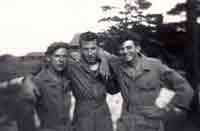
Center - John Ording (my father) with his buddies during WWII
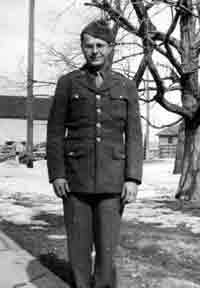
Philip Junk

Elmer Ording |
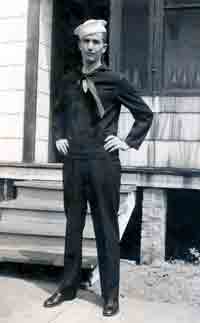
Alvin Ording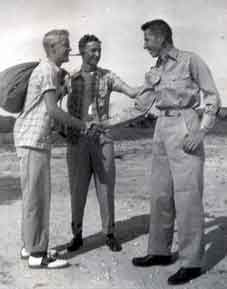
John Ording (right)
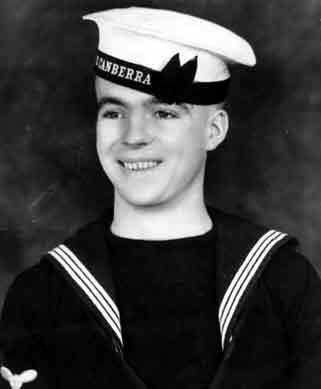
Bernie Beltz of HMAS Canberra lost in Iron Bottom Sound.
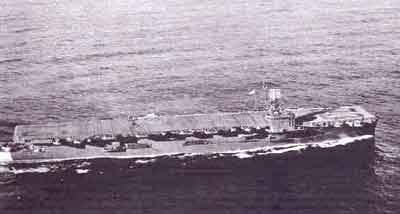
Gambier Bay shortly after her commissioning
January 16, 1944
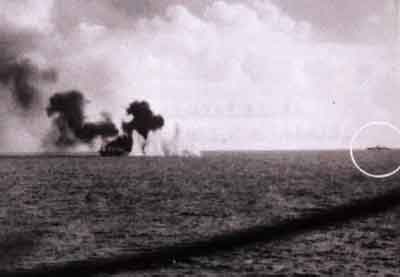
Gambier Bay under attack during battle of Leyte Gulf.
Shows Gambier Bay going down and the Japanese cruiser which sunk
this ship all in the same photo (in the circle)
|